|
|
|
Sort Order |
|
|
|
Items / Page
|
|
|
|
|
|
|
| Srl | Item |
| 1 |
ID:
137551
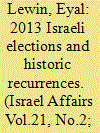

|
|
|
|
|
| Summary/Abstract |
The 2013 election campaign in Israel shows, at first glance, some unanticipated results and unexpected reactions of several political actors. Three events in particular can be noted: (1) the rise of a significant centrist middle-class party; (2) the association of the newly elected right-wing Prime Minister with his left-wing rivals; and (3) the revival of a national religious party after years of decline. A broad overview, however, reveals that from many perspectives numerous key elements of Israeli politics have remained broadly the same over the decades. Some unanticipated outcomes of the elections are to a substantial extent repetitions of past events, referred to in this paper as historic recurrences. In order to establish this claim about historic recurrence, each event is compared to past events with which several striking similarities are found. In order to explain the phenomenon of historic recurrence in Israeli politics, two sets of concepts are applied: the sociological terminology regarding reference group and collective identity, and rational choice theories about voter behaviour and the preferences of political actors.
|
|
|
|
|
|
|
|
|
|
|
|
|
|
|
|
| 2 |
ID:
137193
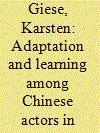

|
|
|
|
|
| Summary/Abstract |
Introduction to Journal of Current Chinese Affairs 1/2015: The Chinese Presence in Africa: A Learning Process
|
|
|
|
|
|
|
|
|
|
|
|
|
|
|
|
| 3 |
ID:
108533
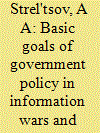

|
|
|
| 4 |
ID:
132889
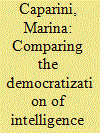

|
|
|
|
|
| Publication |
2014.
|
| Summary/Abstract |
This article discusses the reform of intelligence governance in two sub-regional groupings of former communist states: East Central Europe and the Balkans. These two sub-regions are delineated according to the pace and nature of transformations that they have undergone since the collapse of communist rule and their relations with respect to the European Union, the key political and economic organization in Europe. A number of lessons are drawn from comparing experiences in the two sub-regions relating to democratic reform of the security apparatus, and in particular the intelligence sector. Significant factors in the consolidation of democratic governance of intelligence include the nature of precursor communist-era regimes and the legacies they created, whether armed conflict has occurred during the transition, the extent and character of external (especially EU) assistance, and the strength of media and civil society. These factors appear to have influenced how transitional regimes have sought to introduce institutional reforms to constrain the powers of those services and their susceptibility to arbitrary use. They also have influenced measures taken to redress abuses by intelligence services under the preceding communist regime and the legitimation of the post-authoritarian state.
|
|
|
|
|
|
|
|
|
|
|
|
|
|
|
|
| 5 |
ID:
112463
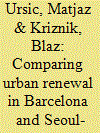

|
|
|
|
|
| Publication |
2012.
|
| Summary/Abstract |
Cities have become increasingly autonomous economic and political actors which actively respond to the pressures and opportunities of globalisation. Consequently, the urban management of any particular city is often based on the assumption that the city can improve its position against rival cities by efficiently managing its strategic resources and promoting its presumed advantages. Though such an approach to urban management may help cities to improve their global competitiveness and the quality of their residents' everyday life, it can sometimes result in negative consequences at the local level, thus actually narrowing the development prospects of the cities in the end. This article discusses urban management against the backdrop of the competitive urban policy in Barcelona and Seoul, and compares the local consequences of urban renewal in both cities. Based on a comparison of the two cases of urban renewal, 22@ Activity District in Barcelona and the Cheonggyecheon restoration in Seoul, this article argues that, in conditions of competition among global cities, even very different approaches to urban management and urban renewal may result in similar consequences at the local level.
|
|
|
|
|
|
|
|
|
|
|
|
|
|
|
|
| 6 |
ID:
129992
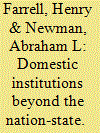

|
|
|
|
|
| Publication |
2014.
|
| Summary/Abstract |
What is the relationship between domestic and international politics in a world of economic interdependence? This article discusses and organizes an emerging body of scholarship, which the authors label the new interdependence approach, addressing how transnational interactions shape domestic institutions and global politics in a world of economic interdependence. This literature makes three important contributions. First, it examines how domestic institutions affect the ability of political actors to construct the rules and norms governing interdependent relations and thus present a source of asymmetric power. Second, it explores how interdependence alters domestic political institutions through processes of diffusion, transgovernmental coordination, and extraterritorial application and in turn how it changes the national institutions mediating internal debates on globalization. Third, it studies the shifting boundaries of political contestation through which substate actors affect decision making in foreign jurisdictions. Given the importance of institutional change to the new interdependence agenda, the authors suggest several instances where historical institutionalist tools might be exploited to address these transnational dynamics, in particular, mechanisms of cross-national sequencing and change strategies of substate actors. As globalization continues, it will be ever more difficult to examine national trajectories of institutional change in isolation from each other. Equally, it will be difficult to understand international institutions without paying attention to the ways in which they both transform and are transformed by domestic institutional politics. While the new interdependence approach does not yet cohere as a single voice, the authors believe that it offers an innovative agenda that holds tremendous promise for both comparative and international relations research as it calls on scholars to reconsider the dynamic nature of globalization for global politics.
|
|
|
|
|
|
|
|
|
|
|
|
|
|
|
|
| 7 |
ID:
133657
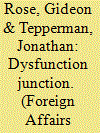

|
|
|
|
|
| Publication |
2014.
|
| Summary/Abstract |
American politics today are a mess, and since the distraction and paralysis of the world's hegemon has such obvious global significance, we decided to turn our focus inward, exploring the sources and contours of the American malaise.
|
|
|
|
|
|
|
|
|
|
|
|
|
|
|
|
| 8 |
ID:
129461
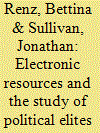

|
|
|
|
|
| Publication |
2013.
|
| Summary/Abstract |
Developments in the information society in Russia have led to the creation of an abundance of online primary texts by political actors and institutions. This article surveys a large selection of official electronic texts with the aim of encouraging more extensive use of online sources and easing researchers' navigation of Russian politicians' use of the internet. While the authors do not claim that online data can replace the insights gained from elite interviews, the article suggests that online texts could be used more extensively as a valuable addition to existing methods applied to the study of Russian political elites.
|
|
|
|
|
|
|
|
|
|
|
|
|
|
|
|
| 9 |
ID:
129946
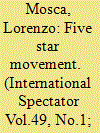

|
|
|
|
|
| Publication |
2014.
|
| Summary/Abstract |
The enduring economic crisis, austerity measures and corruption scandals have created a favourable environment for the advent of new political actors all over Europe. During the last general elections (February 2013), Italy was shocked by the inexorable rise of the Five Star Movement. Beppe Grillo's creature upset the political system, occupying portions of the public sphere that had been ignored (the web) or gradually abandoned by traditional political parties (the squares). Its unusual campaigning style, its internet-based organisational structure, its atypical political positioning (beyond left and right), and its oversimplification of complex problems all help to explain its electoral performance, and distinguish it from similar anti-establishment parties that have emerged in Europe over the past decade.
|
|
|
|
|
|
|
|
|
|
|
|
|
|
|
|
| 10 |
ID:
090680
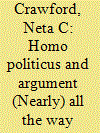

|
|
|
|
|
| Publication |
2009.
|
| Summary/Abstract |
Much theorizing about world politics and many policy recommendations are predicated on a rather thin view of homo politicus, often assuming that humans are rational and self-interested strategic actors and that force is the ultima ratio of politics. This thin notion should be replaced by a richer understanding of homo politicus that includes the characteristic activities of political actors: we fight, we feel, we talk, and we build institutions. This understanding helps illuminate the scope and limits of strategic action, argument and persuasion in world politics in both empirical and normative senses. I describe the spectrum of political action that situates the role of argument and persuasion within the extremes of brute force on one side and mutual communication on the other. I also discuss barriers to argument and communication. Noting the role of argument in this spectrum of international and domestic political practice suggests that it is argument (nearly) all the way down and that the scope of argument can be and in some cases has increased over the longue durée. Coercion, by itself, has a limited role in world politics. The claim that there are distinctive logics of argumentation, strategic action, or appropriateness misses the point. Argument is the glue of politics-its characteristic practice. Understanding politics as argumentation has radical empirical and normative implications for the study and practice of politics.
|
|
|
|
|
|
|
|
|
|
|
|
|
|
|
|
| 11 |
ID:
137173
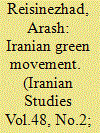

|
|
|
|
|
| Summary/Abstract |
The Iranian Green Movement emerged after the presidential election in June 2009. The paper tracks down its foundational origins through the concept of ‘fragmented collective action’, that points to the dispersion of a social movement's political energies and the fragmentation of its constitutive groups. It also addresses the significance of informal mobilizing networks and the widespread use of modern virtual space to bring together an intersubjectively constructed collective identity which was shaped by the movement’s interactions with political forces and with its interlocutors. Finally, the paper argues that the collective identity shaped the movement's strategies over the course of its evolution.
|
|
|
|
|
|
|
|
|
|
|
|
|
|
|
|
| 12 |
ID:
133628
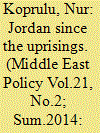

|
|
|
|
|
| Publication |
2014.
|
| Summary/Abstract |
The Islamist movement - in particular the Muslim Brotherhood - has begun to be seen as one of the main beneficiaries of the uprisings in the post-2011 Middle East. The Islamist group's support for public rallies (especially in Egypt, Tunisia and Syria) epitomizes a new era of challenge for the incumbent Arab regimes. Although it is too early to speak of structural change or a revolutionary era in the region, the events of the Arab Spring have highlighted the profound effect the Muslim Brotherhood Society (Jamaat al-Ikhwan al Muslimin) is having in most Middle Eastern countries.
|
|
|
|
|
|
|
|
|
|
|
|
|
|
|
|
| 13 |
ID:
131058
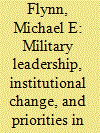

|
|
|
|
|
| Publication |
2014.
|
| Summary/Abstract |
How does political competition among domestic actors influence foreign policy choice? Studies examining these questions often focus on the role of economic or partisan interests, and how they influence the preferences of decision makers who are subject to electoral institutions and pressures of their constituents. Less attention has been paid to how the preferences of other influential but unelected actors influence state behavior. I examine the influence of one such group by looking at how American military leaders shape decisions on military spending and force structure, while also examining how these decisions have been affected by changes to the institutions governing civil-military relations. Results indicate that military leaders occupying key positions can influence defense spending priorities in favor of their respective branches. Results also suggest the influence of military leaders has changed and is conditional upon the institutions governing the relationships between civilian decision makers and military leaders
|
|
|
|
|
|
|
|
|
|
|
|
|
|
|
|
| 14 |
ID:
140179
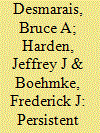

|
|
|
|
|
| Summary/Abstract |
The transmission of ideas, information, and resources forms the core of many issues studied in political science, including collective action, cooperation, and development. While these processes imply dynamic connections among political actors, researchers often cannot observe such interdependence. One example is public policy diffusion, which has long been a focus of multiple subfields. In the American state politics context, diffusion is commonly conceptualized as a dyadic process whereby states adopt policies (in part) because other states have adopted them. This implies a policy diffusion network connecting the states. Using a dataset of 187 policies, we introduce and apply an algorithm that infers this network from persistent diffusion patterns. The results contribute to knowledge on state policy diffusion in several respects. Additionally, in introducing network inference to political science, we provide scholars across the discipline with a general framework for empirically recovering the latent and dynamic interdependence among political actors.
|
|
|
|
|
|
|
|
|
|
|
|
|
|
|
|
| 15 |
ID:
109232
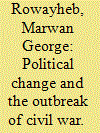

|
|
|
|
|
| Publication |
2011.
|
| Summary/Abstract |
Although the Lebanon of post 2005 is similar in many respects to the Lebanon of the 1950s and 1970s, this article demonstrates that between 2005 and 2011 the country was in less danger of the outbreak of civil war than in 1958 or in 1975. The political circumstances that prevailed in 1958 and in 1975 had made the outbreak of a civil war in the interest of political actors. The introduction of some of the reforms introduced by the Taif Accord since 2005 made many actors more likely to use constitutional methods to resolve conflicts. When these methods failed, the protests were either peaceful or violent, but over short periods of time. On many occasions these protests brought the country to the brink of civil war. Nevertheless, these protests did not escalate into large-scale or long-term communal militant violence. This was not because of a sense of war weariness but because of the influence of the prevailing political circumstances that made the outbreak a civil war appear to be a strategic error.
|
|
|
|
|
|
|
|
|
|
|
|
|
|
|
|
| 16 |
ID:
131501
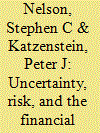

|
|
|
|
|
| Publication |
2014.
|
| Summary/Abstract |
The distinction between uncertainty and risk, originally drawn by Frank Knight and John Maynard Keynes in the 1920s, remains fundamentally important today. In the presence of uncertainty, market actors and economic policy-makers substitute other methods of decision making for rational calculation-specifically, actors' decisions are rooted in social conventions. Drawing from innovations in financial markets and deliberations among top American monetary authorities in the years before the 2008 crisis, we show how economic actors and policy-makers live in worlds of risk and uncertainty. In that world social conventions deserve much greater attention than conventional IPE analyses accords them. Such conventions must be part of our toolkit as we seek to understand the preferences and strategies of economic and political actors.
|
|
|
|
|
|
|
|
|
|
|
|
|
|
|
|
|
|
|
|
|